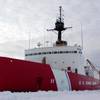The Conference Report for the Coast Guard and Maritime Transportation Act of 2006 (H.R. 889) has been posted on the Internet. As the name implies, this report has been agreed to by members of the joint House-Senate Conference Committee and is almost certainly the version of the bill that will be adopted by the House of Representatives and the Senate when they return from the current recess. Among the more interesting provisions are the following:
(1) Developers of LNG import facilities will get a higher priority if they agree to be supplied by US-flag LNG vessels;
(2) Only US-flag vessels will be allowed to engage in any activity performed in connection with the mooring or unmooring of a mobile offshore drilling unit (MODU) located over the US outer continental shelf or the transportation of personnel or merchandise to or from a point in the United States from or to such MODU;
(3) Use of foreign citizens as riding gangs would be allowed under certain conditions on US-flag vessels when US citizens or residents are unavailable to complete the work, but for not more than 60 days each calendar year;
(4) An offshore wind energy facility may not be constructed in Nantucket Sound if either the USCG Commandant or the Governor of an adjacent state disapproves;
(5) Monies are authorized for development of an alternative AIS transponder/wireless maritime data device and the FCC is encouraged to finalize its rulemaking on licensee use of AIS frequency bands;
(6) Persons who release into a waterway an object that creates an obstruction to navigation would be required to promptly notify the Coast Guard;
(7) Limits of liability for oil spills from vessels would be increased – for single-hull tankers to $3,000 per gross ton or $22 million – for double-hull tankers to $1,900 per gross ton or $16 million – for other vessels to $950 per gross ton or $800,000; and
(8) Application of the oil spill response plan requirement to nontank vessels has been clarified.
Source: HK Law
Subscribe for
Maritime Reporter E-News
Maritime Reporter E-News is the maritime industry's largest circulation and most authoritative ENews Service, delivered to your Email five times per week










